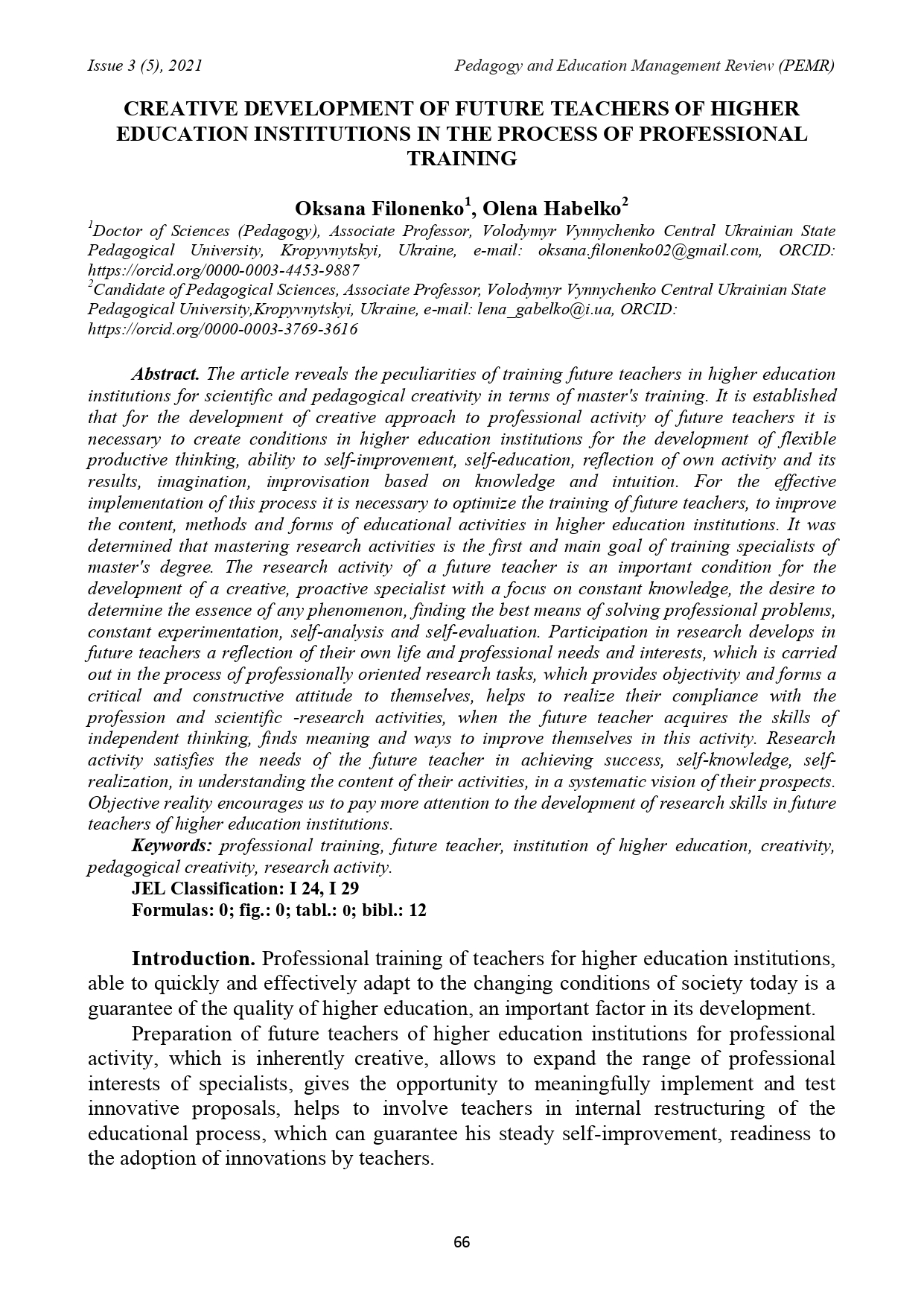CREATIVE DEVELOPMENT OF FUTURE TEACHERS OF HIGHER EDUCATION INSTITUTIONS IN THE PROCESS OF PROFESSIONAL TRAINING
DOI:
https://doi.org/10.36690/2733-2039-2021-3-66Keywords:
professional training, future teacher, institution of higher education, creativity, pedagogical creativity, research activityAbstract
The article reveals the peculiarities of training future teachers in higher education institutions for scientific and pedagogical creativity in terms of master's training. It is established that for the development of creative approach to professional activity of future teachers it is necessary to create conditions in higher education institutions for the development of flexible productive thinking, ability to self-improvement, self-education, reflection of own activity and its results, imagination, improvisation based on knowledge and intuition. For the effective implementation of this process it is necessary to optimize the training of future teachers, to improve the content, methods and forms of educational activities in higher education institutions. It was determined that mastering research activities is the first and main goal of training specialists of master's degree. The research activity of a future teacher is an important condition for the development of a creative, proactive specialist with a focus on constant knowledge, the desire to determine the essence of any phenomenon, finding the best means of solving professional problems, constant experimentation, self-analysis and self-evaluation. Participation in research develops in future teachers a reflection of their own life and professional needs and interests, which is carried out in the process of professionally oriented research tasks, which provides objectivity and forms a critical and constructive attitude to themselves, helps to realize their compliance with the profession and scientific -research activities, when the future teacher acquires the skills of independent thinking, finds meaning and ways to improve themselves in this activity. Research activity satisfies the needs of the future teacher in achieving success, self-knowledge, self-realization, in understanding the content of their activities, in a systematic vision of their prospects. Objective reality encourages us to pay more attention to the development of research skills in future teachers of higher education institutions.
Downloads
References
Vitvyts'ka, S. S. (2005), Praktykum z pedahohiky vyshchoyi shkoly: navch. Posibnyk [Workshop on Pedagogics of Higher Education], K.: Tsentr navchal'noyi literatury. [in Ukraine]
Vitvyts'ka, S. S. (2004), Suchasni tekhnolohiyi pidhotovky mahistriv v umovakh stupenevoyi pedahohichnoyi osvity [Modern technologies of masters training under conditions of advanced pedagogical education], Visnyk Kyyivs'koho mizhnarodnoho universytetu, K.: KMU, Seriya: Pedahohichni nauky. Vyp. 5. [in Ukraine]
Hura, O. I. (2008), Teoretyko-metodolohichni osnovy formuvannya psykholoho-pedahohichnoyi kompetentnosti vykladacha vyshchoho navchal'noho zakladu v umovakh mahistratury [Theoretical and methodological foundations of formation of psychological and pedagogical competence of a teacher of a higher educational establishment in the conditions of a magistracy], Avtoref. dys. na zdobuttya nauk. stupenya d-ra ped. nauk: spets. 13.00.04 “Teoriya i metodyka profesiynoyi osvity”. [in Ukraine]
Zakon Ukrayiny «Pro vyshchu osvitu» [Law of Ukraine "On Higher Education"] vid 01.07.2014 № 1556-VII / Baza danykh «Zakonodavstvo Ukrayiny» / Verkhovna Rada Ukrayiny. URL: http://zakon3.rada.gov.ua/laws/show/en/1556-18 [in Ukraine]
Zakon Ukrayiny «Pro osvitu» [Law of Ukraine "On Education"] vid 05.09.2017 № 38-39 / Baza danykh «Zakonodavstvo Ukrayiny» / Verkhovna Rada Ukrayiny. URL: http://zakon3.rada.gov.ua/laws/show/2145-19 [in Ukraine]
Zeyer, E. F. (1988), Professional'noye stanovleniye lichnosti inzhenera-pedagoga [Professional formation of the personality of an engineer-teacher], Sverdlovsk: I zd-vo Ural. un-ta. [in Russian].
Kan-Kalik, V. A., Nikandrov, N. D. (2003), Pedagogicheskoye tvorchestvo [Pedagogical creativity], M. [in Russian].
Lazarev, V. S., Stavrinova, N. N. (2006), Kriterii i urovni gotovnosti budushchego pedagoga k issledovatel'skoy deyatel'nosti [Criteria and levels of readiness of the future teacher for research activities], Pedagogika, № 2. [in Russian].
Markova, A. K. (2003), Psikhologiya truda uchitelya [The Psychology of Labor of a Teacher], M.: Prosveshche-niye. [in Russian].
Passov, Ye. I. (2002), Kul'turosoobraznaya model' professional'noy podgotovki uchitelya: filosofiya, soderzhaniye, realizatsiya [Cultural model of professional training of a teacher: philosophy, content, implementation], Ínozemní movi, № 4. [in Russian].
Sukhomlyns'kyy, V O. (1971), Metodyka vykhovannya kolektyvu [Method of education of the collective], K.: Rad. Shkola. [in Ukraine]
Shcherbakova, T. N. (2013), Tvorchestvo v deyatel'nosti sovremennogo pedagoga [Creative Work in the Activities of a Modern Teacher], Aktual'nyye voprosy sovremennoy pedagogiki: materialy IV mezhdunarodnoy na-uchnoy konferentsii, (g. Ufa, noyabr' 2013 g.) Ufa: Leto. [in Russian].






